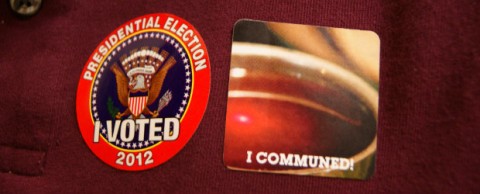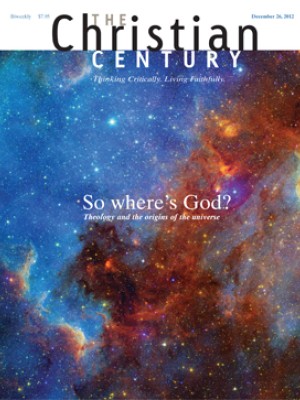Altar politics: Sharing communion on Election Day

I don’t know when it happened exactly, but at some point the most important event on my calendar for November 6, 2012, was not the presidential election. At some point, the unrelenting political advertisements, the carefully crafted robocalls and the irrepressible news accounts lost their power to elicit my fears and hopes or even capture my attention. I began to believe that the most important thing about November 6 was that the church would gather for communion.
Three months before Election Day, two friends and I began a project called Election Day Communion. We were concerned that Christians were being shaped more by the tactics and ideologies of political parties than by our faith and unity in Jesus. I’ve noticed this inclination in myself. Captivated by the strategies and posturing that accompany the pursuit of power, I can easily forget where I place my hope, to whom I pledge my allegiance and how transformation happens.
Read our latest issue or browse back issues.
So we plunked down 20 bucks and created a website to communicate this simple invitation: Join us at the Lord’s Table on Election Day to remember, to give thanks for and to witness to our faith in Jesus. We invited our friends, and our friends invited their friends, and soon many people were sharing and responding to the call of Election Day Communion.
At first, we set a goal of having 100 participating congregations. At one point, we were adding 100 congregations per week. By Election Day, 899 congregations, schools or groups—in 50 states and 25 denominations—had indicated their intention to gather for communion on Election Day.
On November 6, photos and reflections began trickling in from services across the country. Some ministerial associations offered citywide communion services in public settings. Congregations of different denominations worshiped together. Christians in Washington, D.C., gathered by candlelight in the National Mall to pray, to sing hymns and to celebrate a memorial quite different from the monuments nearby. In Lexington, Kentucky, people brought warm clothing to a homeless shelter before gathering for worship. Friends and families met in homes, and students, faculty and staff came together at colleges and universities.
Lauren Lobenhofer of Bon Air United Methodist Church in North Chesterfield, Virginia, reported: “People who I have never seen cry in my ministry at this church came to the table with tears in their eyes. Youth who cannot sit still embraced the silent stillness of worship. And I remembered, again, that it is Christ, not the government, that gives us hope and salvation.”
Curtis Bronzan at Good Shepherd Presbyterian Church in Los Alamitos, California, found that Election Day communion allowed those outside of the church to “peek into the lives of people seeking to follow Jesus. And we’re at our best when we realize that our ultimate hope and allegiance is in the table that unites us and represents the love poured out by Jesus himself. By God’s grace and peace, we can actually embody this love as well.”
The church building of North Goshen Mennonite Church in Indiana, where I serve, was a polling place during the day and a place for worship in the evening. Joining with another congregation in our neighborhood, we began the service by reminding each other that “no president can claim our highest allegiance and no party can compete with our first love.”
When we sang “My Hope Is Built on Nothing Less,” we were reminded that our future depends not on the outcome of an election but on what has already happened in the life, death and resurrection of Jesus. We reflected on the Beatitudes as both a description of the kingdom in which we place our citizenship and a vision of where the Holy Spirit leads God’s people.
After praying for God’s kingdom to come and God’s will to be done on earth as it is in heaven, we gathered in a large circle for communion. Facing our sisters and brothers, we re-membered the body of Christ by eating the bread and drinking the cup together. Our service ended with the simple reminder that God’s power— at work within us—can accomplish abundantly far more than we could ask or imagine.
In the days that followed, numerous people commented how they experienced healing by celebrating unity in Christ while openly acknowledging differences. Friends with passionate political opinions told me that they decided to keep their televisions off after our service. For some reason, they said, they could wait to hear the outcome of the election.
I don’t know when it happened exactly, but it did happen. When I saw a campaign button, I thought about preparing for communion. When I heard a politician call for my vote, I heard Christ’s call to the table. When I felt my hopes and fears being manipulated to gain my vote, I remembered the bread and the cup. I don’t know when it happened, but I have a good idea how it did: the power of Christ through his church was transforming the world.





